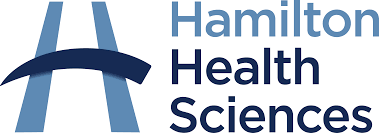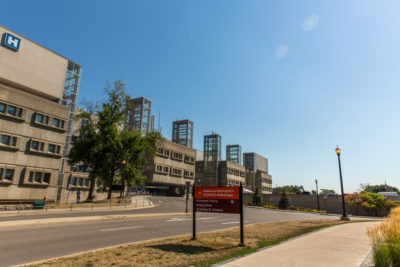The Voice Clinic at McMaster Children’s Hospital / McMaster University Medical Center is made up of professionals who diagnose and treat patients with a variety of voice and/or upper airway problems that may affect voice quality, range, stamina, effort, pain, communication, and overall well-being.
Who comes to the voice clinic?
Symptoms that bring people to our clinic include:
- Recurrent or persistent hoarseness
- Loss of vocal range
- Periodic voice loss
- Voice fatigue
- Muscle and neck pain in association to voice use
- Decreased vocal power or projection
- Breathing problems that may involve the vocal cords
- Chronic coughing or throat clearing
Other People who come to see us include:
- Patients with neurological or autoimmune conditions that affect the voice
- Patients with a tracheostomy learning to use a speech valve
- Transgender patients
- Patients who need pre- and post-phonosurgical follow-up and rehabilitation
- …and more
Most voice disorders are easily treatable when diagnosed properly. It is important to address your vocal needs quickly before they worsen. A voice problem can indicate something as simple as viral laryngitis or as serious as vocal fold (cord) cancer.
Please note: The Voice Clinic does NOT treat speech problems related to language development, articulation, fluency (stuttering), or other problems not specifically related to the voice. Please go to the RESOURCES section below for information on how to find other services.
Team Members
The services offered by the voice clinic involve close collaborations between clinicians with diverse professional backgrounds, who have a special interest in voice and voice disorders in children and adults:
- Speech Language Pathologist (S-LP, or Speech Therapist): The S-LP is an accredited professional who has an in-depth knowledge of the anatomy of the throat and is well versed in functional aspects of phonation. The S-LP therapeutically assists patients in rehabilitation and/or optimization of the voice function in relation to both speech and singing voice production.
- Ear, Nose and Throat Doctor (ENT) – a medical specialist with expertise in the anatomy and function of the throat. The ENT conducts examinations to determine the medical factors potentially contributing to voice problems. (You can find more information on the ENT Clinics at HHS here.)
- Communication Disorders Assistant
- Business Clerks
Care We Provide
The voice clinic provides both assessment and treatment. Referrals to other clinics or services may be made as needed.
Conditions we treat:
- Functional Dysphonia: primary or adaptive muscle tension dysphonia or stress, trauma, or psychogenic related voice quality changes.
- Gender-related voice concerns (vocal dysphoria).
- Spasmodic Dysphonia: spasms affecting the closing or opening of the vocal fold muscles.
- Laryngopharyngeal Reflux: Lax upper esophageal sphincter leading to acid related changes of laryngeal mucosa.
- Laryngitis: Inflammation of the vocal folds.
- Respiratory Papilloma: Human papillomavirus affecting specifically vocal folds and pharyngeal space.
- Vocal Fold Dysplasia: Leukoplakia, Erythroplakia, Keratosis- cell level changes in the vocal folds.
- Benign Vocal Fold Lesions: nodules, polyps, cysts, granuloma.
- Vocal Fold Paralysis/ Paresis: Immobility or reduced mobility of one or both vocal folds.
- Irritable Larynx Syndrome: Groups of symptoms not associated to a specific condition, such as: chronic cough or throat clearing, paradoxical vocal fold motion, globus sensation (feeling of a lump in the throat) laryngeal spasms, tightness of the throat or neck, throat irritation/burning sensation.
- Inducible Laryngeal Obstruction (previously named PVFMD): upper airway obstruction sometimes involving the vocal folds during inspiration.
- Hemorrhage: collection of blood within the vocal fold due to the rupture of a blood vessel.
- Reinke’s Edema: inflammation of the mucosa tissues typically due to smoking.
- Presbyphonia: Age related vocal quality changes such as voice breaks, increased breathiness, and reduced range.
What To Expect
Each appointment is 45 minutes long. We offer both in-person and virtual appointments.
At your first appointment, you will meet with a Speech-Language Pathologist (S-LP), who will ask you for a description and history of your voice concerns and medical history, and you will participate in perceptual and acoustical voice-related measurements.
For in-person assessments, fifteen minutes may be reserved for the visualization of your vocal folds. An Ear, Nose, and Throat specialist (ENT) teams with the S-LP to conduct a Laryngovideoendostroboscopy (LVES) examination. The LVES is a scope that is able to take a video recording of your vocal folds and their vibration. Patients may review the imaging with the team. Sedation is not used, and the procedure is very brief.
Once the assessment is done, you will be given recommendations and direction regarding treatment options and follow-up. This may include voice therapy/vocal coaching, medication and/or surgery.
How to Prepare
No special preparation is needed for your assessment visit. It helps to make note of any questions or notes you have regarding your voice, including your symptoms or concerns and any patterns you observe.
What to bring:
- Ontario Health (OHIP) Card. If you do not have an OHIP card, please bring another form of government-issued photo ID, such as a driver’s license or passport.
- A List of medications for you or your child, including prescriptions, over-the-counter, vitamins, mineral supplements and herbal remedies.
- A trusted friend or family member who can help, if needed.
- A List of doctors and hospitals seen in the past who may have information related to your or your child’s voice problem.
- A list of questions to help you remember everything you want to ask
When you arrive, please check in at the reception desk. The Business Clerk will register you in so that your team will know that you have arrived.
Please wear a mask or have your child wear a mask in the case of a cough or runny nose. We ask that you do not cancel an appointment in relation to throat soreness or minor cold symptoms.
Referral Process
Referrals may be made internally via Epic or faxed directly to the clinic at 905-521-8552. The HIN# and clear demographic information is required. Please use this link to access the Voice Clinic referral form.
External referrals are accepted only for patients who reside within the Hamilton Niagara Haldimand Brant and Waterloo Wellington Regions (LHIN). Please see the RESOURCES section below for more information.
Pediatrics (0-18 years): A family physician’s signature and referral is mandatory and may be faxed directly to the clinic at: 905-521-8552. Please note that HIN # are mandatory for each referral as well as clear patient demographics.
Adults: An referral by an ENT is required for adult patients.
Priority adult referrals are reviewed on an individual basis. If you feel the need is urgent, please provide details in the referral. Referrals considered urgent may include transgender individuals, professional voice users – (singers, public speakers, teachers), or anyone whose livelihood is significantly affected by their voice problem. Patients who have breathing issues potentially related to the vocal cords may also be referred by a Respirologist.
Please note: The Voice Clinic is not for emergencies. If you or your child need to be seen on an emergency basis, please call your family doctor or go to your local emergency department.
Resources
RESOURCES
Voice Care – We believe in educating our patients so they can maintain good vocal health. We take your vocal health seriously. Download our flyer on voice care
Stretching is good for the voice, too! For some simple stretches that can help relieve the muscle tension that can contribute to voice problems, please refer to this video.
Quick tips:
- Keep well hydrated; sip water throughout the day
- Avoid or limit caffeine and alcohol, as they dehydrate the voice. When you do consume any, boost your water intake.
- Avoid smoking and exposure to second hand smoke.
- Allow time for silent breaks throughout the day, especially after times when voice use is increased.
- Throat pain and hoarseness are a signal to rest your voice. If the symptoms persist, see your doctor.
- Avoid yelling as much as possible. Use other tools to save your voice: if there is a microphone available, grab it, or ask for one! Use a noisemaker at a hockey game. Don’t try to sing the lyrics above the noise at a concert.
- Have a sip of water or swallow with effort the next time you need to clear your throat.
Other Links
Local Health Integration Networks (LHINs)
You may use these websites to look for other voice services in your area, or for non-voice related speech services. There is a website for every LHIN in Ontario; nearby LIHNs include the following:
Niagara Haldimand Brant LHIN: https://www.hnhbhealthline.ca
Waterloo Wellington LHIN: https://wwhealthline.ca
Mississauga Halton LHIN: https://www.mississaugahaltonhealthline.ca
Speech-Language and Audiology Canada (SAC)
You may use the search directory to locate a Speech-Language Pathologist or Audiologist in your area. It is possible to search according to specialty as well. Please use this link, https://www.sac-oac.ca/for-the-public.
MyChart
My Chart is a website used by Hamilton Health Sciences where patients can create and manage their own personal health information. Patients can safely and confidentially access results, manage appointments, complete questionnaires and communicate with members of their care team. Patients are encouraged to register and make use of this tool. To join, please use this link: https://www.mychart.ca/

